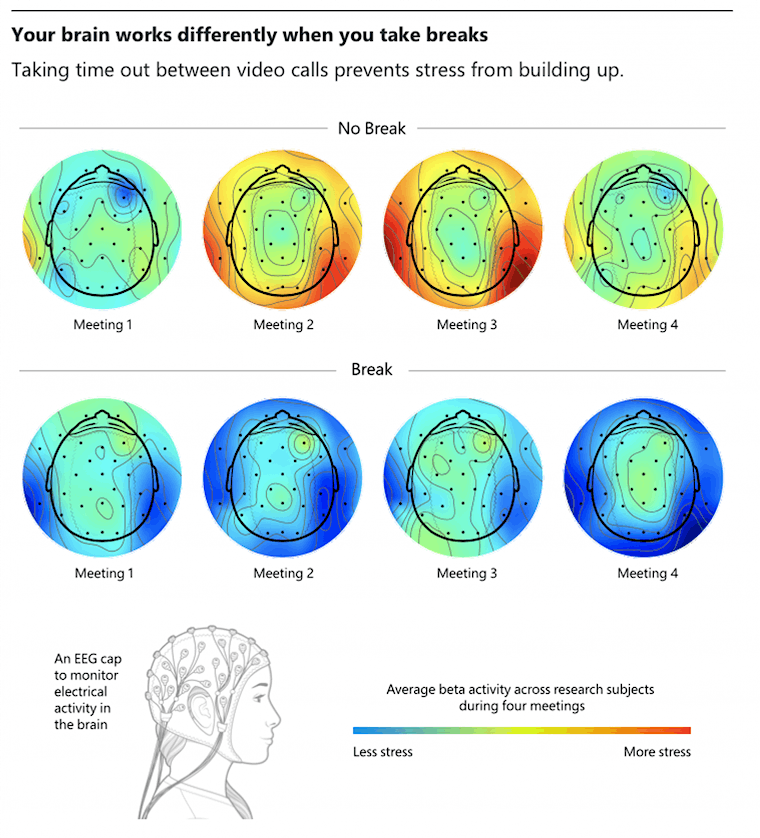Brain Research Confirms Stupidity Of Back-to-Back Meetings

Most people have way too many meetings at work. This sucks. And it's frustrating. Brain research now confirms what we have all experienced: back-to-back meetings are stupid.
Back when everyone worked in offices, we knew meetings sucked. For now, at least, the pandemic relieves us of going to the office all the time.
However, it hasn't relieved us of poor ways of working. Most companies have taken all the bad stuff from office work, moved it online, and called it 'remote work'. That's not only frustrating, it's stupid.
Here's why.
What the research says
A recent study by Microsoft’s Human Factors Lab "sought to find a solution for meeting fatigue—a pressing concern in our new era of remote and hybrid work".
(A bit naive to think this has just become a problem, but hey, let's give them a break.)
This study involved volunteers wearing electroencephalogram (EEG) equipment to monitor electrical activity in their brains. Each participated in two different sessions of meetings.
"On one day they attended stretches of four half-hour meetings back-to-back, each devoted to different tasks—like designing an office layout, or creating a marketing plan. On another, the four half-hour meetings were interspersed with 10-minute breaks. Instead of jumping sraight from one meeting to the next, participants meditated with the Headspace app during the breaks."
The research showed three main takeaways.
1. Breaks help to reset the brain
With back-to-back meetings stress kept accumulating. The average activity of beta waves—those associated with stress—increased over time.
However, when taking a break between meetings to meditate, beta activity dropped significantly. This 'reset' led to participants being more relaxed when the next meeting started. Plus, there was no buildup of stress over the four video calls.

Useful, but not very surprising. A simple solution to stress and meeting overload? Take short breaks between your video calls.
2. Breaks increase focus and engagement
"When participants had meditation breaks, brainwave patterns showed positive levels of frontal alpha asymmetry. This correlates with higher engagement during the meeting. Without breaks, the levels were negative, suggesting participants were withdrawn, or less engaged in the meeting."

Breaks don't only alleviate stress, they also help us stay focused and engaged.
3. Breaks help in transitioning
"For the participants deprived of breaks, researchers also noticed that the transition period between calls caused beta activity, or stress levels, to spike. For those participants, beta wave activity jumped again when new check ins started."

"Taking breaks not only prevents those spikes but causes a dip in beta activity—which correlates with less stress."
Conclusion: Breaks help make the transitions between meetings less stressful.
Shift your mindset
While this study is useful, its findings don't surprise. They simply confirm what we experience: back-to-back meetings suck, and lead to stress, fatigue and disengagement.
The bigger problem? Even though we all feel this, not much changes. Maybe deep down we doubt these feelings. Maybe we still feel (hope?) that having back-to-back meetings is the best thing to do. That is, you just need to overcome fatigue and stress, and toughen up to plow through your workday.
The study once again shows you it's not. So let's break the taboo of declining meetings. Stop feeling ashamed when you tell colleagues, "I'll skip this meeting because I want to be more productive and less stressed."
The concluding remarks of the study are perhaps the most important: "Shift your mindset. While it might feel more productive to power through back-to-backs, research shows the opposite is true. View breaks away from your computer as an essential part of your workday."
Run better meetings
To learn more about running fewer and better meetings, join our online course 'Run better meetings'.
